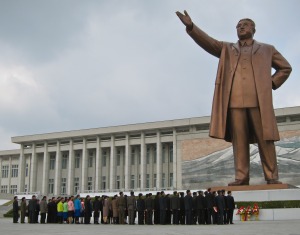United Nations Moves to Send North Korean Human Rights Case to International Criminal Court
On November 18th, the United Nations passed a resolution recommending that the International Criminal Court (ICC) in the Hague prosecute the North Korean leadership, including Supreme Leader Kim Jong-un, for its repeated human rights abuses. The General Assembly of the United Nations voted 111-19 in favor of the resolution, and although 55 countries abstained, the victory remained extremely wide. The language of the resolution is also important, as North Korea and some of its allies campaigned over the course of the last week to soften it. Cuba, one of North Korea’s few allies, suggested an amendment to delete the referral to the ICC. However, this proposal was defeated 40-77 after a final push by the main countries that drafted the original resolution, including European Union members and Japan.

The movement to pass this resolution began in February 2014, when the United Nations Office of the High Commissioner for Human Rights released a report on human rights conditions in North Korea. This report included the first mention of eventually referring the case to the International Criminal Court, and exposed human rights conditions as unparalleled worldwide: it cited “extermination, murder, enslavement, torture, imprisonment, rape, forced abortions and other sexual violence, persecution on political, religious, racial and gender grounds, the forcible transfer of populations, the enforced disappearance of persons and the inhumane act of knowingly causing prolonged starvation,” as the main violations observed. The North Korean government refused to cooperate with investigators, once again showing its resistance to international influence and desire to remain as isolated as possible.
From February to November, when the UN passed the resolution, North Korea addressed its human rights record on multiple occasions. When the report was originally published, North Korea issued a violent statement accusing the UN and the United States of political fabrications and slandering the lead investigator on the report Michael Kirby with homophobic slurs, a rather surprising incident as North Korea does not recognize homosexuality as a reality.
A few months later in September, North Korea also published its own 53,000-word report on domestic human rights conditions, in which it claims to offer its population freedom of speech and religion, as well as many other rights that citizens of liberal democracies benefit from. Some progress seemed to come when North Korea opened up to the idea of dialogue and expressed interest in improving its human rights record. The government in Pyongyang even acknowledged the existence of labor camps on its territory, a major statement that had never been made before.
Although most of the international community agreed that these North Korean concessions showed a shift from the nation’s past rhetoric, nobody was celebrating – only concrete action on Pyongyang’s part would have been considered a real victory. As expected, immediately after the resolution was passed, North Korea reverted back to its hardline stance. After calling the resolution a “political provocation,” North Korea threatened to proceed with a new nuclear test, a major move – Pyongyang has only conducted 3 in the last 9 years. The government’s strong reaction shows its insecurity on the international stage, and need to demonstrate power.
The resolution itself is non-binding, and is only the beginning of a long process if any action is to be taken: only the Security Council could issue an authoritative mandate for the ICC to prosecute North Korean leadership. However, China and possibly Russia will likely veto the bill – China voted against the resolution itself. In addition, an ICC prosecution would mean relatively little; the court’s influence is limited and its successes are few in number. Thus, North Korea’s response was rather disproportionate, and simply reflective of its own need to maintain appearances.
Thus, the resolution’s role is more symbolic than anything, and it is unlikely that it will lead to any concrete action against the North Korean government, but the fact that the resolution even passed by such a large majority shows that the world is taking note of the human rights abuses occurring in North Korea. Most UN resolutions on North Korea in past years have related to Pyongyang’s nuclear program, so major human rights groups like Human Rights Watch and Amnesty International see this as a move in the right direction. Although the bill was originally drafted by the European Union, it was sponsored and supported by a record 60 other UN members, showing how important this issue has become. Even if no tangible results come out of this specific resolution, it has pushed North Korea’s human rights back into the spotlight, and future action through other channels is not inconceivable.
